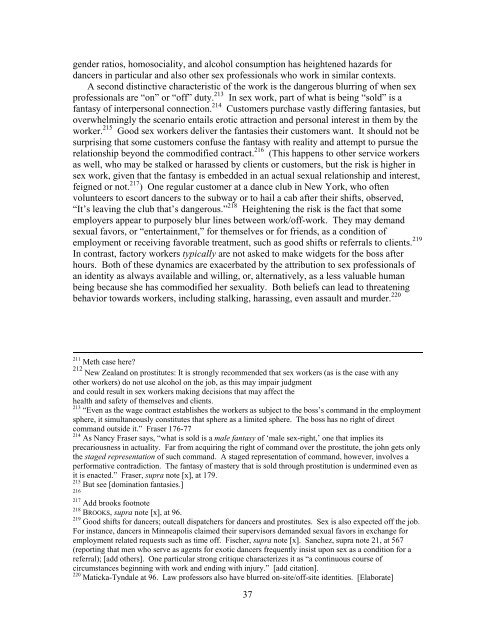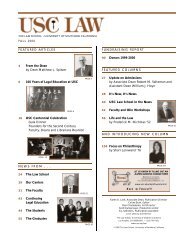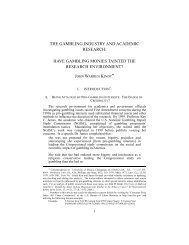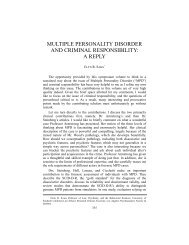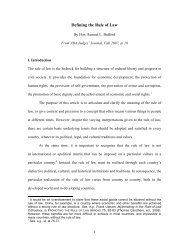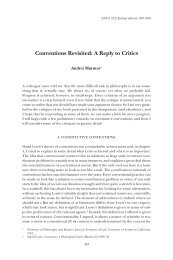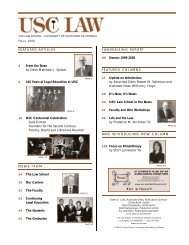1 Regulating Sex Work Adrienne D. Davis VERY ROUGH DRAFT ...
1 Regulating Sex Work Adrienne D. Davis VERY ROUGH DRAFT ...
1 Regulating Sex Work Adrienne D. Davis VERY ROUGH DRAFT ...
You also want an ePaper? Increase the reach of your titles
YUMPU automatically turns print PDFs into web optimized ePapers that Google loves.
gender ratios, homosociality, and alcohol consumption has heightened hazards for<br />
dancers in particular and also other sex professionals who work in similar contexts.<br />
A second distinctive characteristic of the work is the dangerous blurring of when sex<br />
professionals are “on” or “off” duty. 213 In sex work, part of what is being “sold” is a<br />
fantasy of interpersonal connection. 214 Customers purchase vastly differing fantasies, but<br />
overwhelmingly the scenario entails erotic attraction and personal interest in them by the<br />
worker. 215 Good sex workers deliver the fantasies their customers want. It should not be<br />
surprising that some customers confuse the fantasy with reality and attempt to pursue the<br />
relationship beyond the commodified contract. 216 (This happens to other service workers<br />
as well, who may be stalked or harassed by clients or customers, but the risk is higher in<br />
sex work, given that the fantasy is embedded in an actual sexual relationship and interest,<br />
feigned or not. 217 ) One regular customer at a dance club in New York, who often<br />
volunteers to escort dancers to the subway or to hail a cab after their shifts, observed,<br />
“It’s leaving the club that’s dangerous.” 218 Heightening the risk is the fact that some<br />
employers appear to purposely blur lines between work/off-work. They may demand<br />
sexual favors, or “entertainment,” for themselves or for friends, as a condition of<br />
employment or receiving favorable treatment, such as good shifts or referrals to clients. 219<br />
In contrast, factory workers typically are not asked to make widgets for the boss after<br />
hours. Both of these dynamics are exacerbated by the attribution to sex professionals of<br />
an identity as always available and willing, or, alternatively, as a less valuable human<br />
being because she has commodified her sexuality. Both beliefs can lead to threatening<br />
behavior towards workers, including stalking, harassing, even assault and murder. 220<br />
211 Meth case here?<br />
212 New Zealand on prostitutes: It is strongly recommended that sex workers (as is the case with any<br />
other workers) do not use alcohol on the job, as this may impair judgment<br />
and could result in sex workers making decisions that may affect the<br />
health and safety of themselves and clients.<br />
213 “Even as the wage contract establishes the workers as subject to the boss’s command in the employment<br />
sphere, it simultaneously constitutes that sphere as a limited sphere. The boss has no right of direct<br />
command outside it.” Fraser 176-77<br />
214 As Nancy Fraser says, “what is sold is a male fantasy of ‘male sex-right,’ one that implies its<br />
precariousness in actuality. Far from acquiring the right of command over the prostitute, the john gets only<br />
the staged representation of such command. A staged representation of command, however, involves a<br />
performative contradiction. The fantasy of mastery that is sold through prostitution is undermined even as<br />
it is enacted.” Fraser, supra note [x], at 179.<br />
215 But see [domination fantasies.]<br />
216<br />
217 Add brooks footnote<br />
218 BROOKS, supra note [x], at 96.<br />
219 Good shifts for dancers; outcall dispatchers for dancers and prostitutes. <strong>Sex</strong> is also expected off the job.<br />
For instance, dancers in Minneapolis claimed their supervisors demanded sexual favors in exchange for<br />
employment related requests such as time off. Fischer, supra note [x]. Sanchez, supra note 21, at 567<br />
(reporting that men who serve as agents for exotic dancers frequently insist upon sex as a condition for a<br />
referral); [add others]. One particular strong critique characterizes it as “a continuous course of<br />
circumstances beginning with work and ending with injury.” [add citation].<br />
220 Maticka-Tyndale at 96. Law professors also have blurred on-site/off-site identities. [Elaborate]<br />
37


